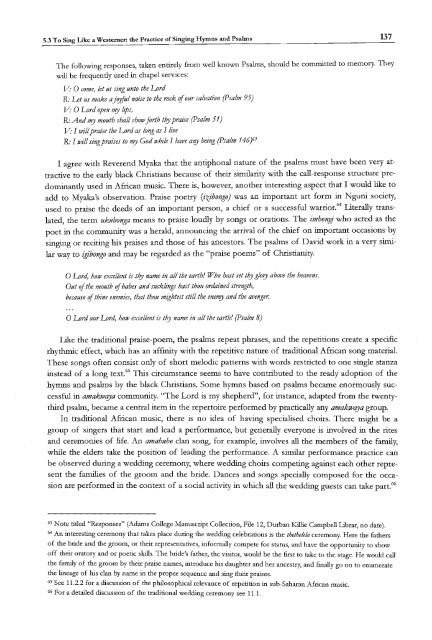South African Choral Music (Amakwaya): Song, Contest and the ...
South African Choral Music (Amakwaya): Song, Contest and the ...
South African Choral Music (Amakwaya): Song, Contest and the ...
You also want an ePaper? Increase the reach of your titles
YUMPU automatically turns print PDFs into web optimized ePapers that Google loves.
5.3 To Sing Like a Westerner: <strong>the</strong> Practice of Singing Hymns <strong>and</strong> Psalms<br />
The following responses, taken entirely from well known Psalms, should be committed to memory. They<br />
will be frequently used in chapel services:<br />
V· 0 come, let us sing unto <strong>the</strong> Lord<br />
R: Let us make ajqyful noise to <strong>the</strong> rock ofour salvation (Psalm 95)<br />
V 0 Lord open my lips,<br />
R: Andmy mouth shall showforth tlypraise (psalm 51)<br />
V I willpraise <strong>the</strong> Lord as long as I live<br />
R: I will singpraises to my God while I have a'!Y being (psalm 146)63<br />
I agree with Reverend Myaka that <strong>the</strong> antiphonal nature of <strong>the</strong> psahns must have been very attractive<br />
to <strong>the</strong> early black Christians because of <strong>the</strong>ir similarity with <strong>the</strong> call-response structure predomin<strong>and</strong>y<br />
used in <strong>African</strong> music. There is, however, ano<strong>the</strong>r interesting aspect that I would like to<br />
add to Myaka's observation. Praise poetry (izibongo) was an important art form in Nguni society,<br />
used to praise <strong>the</strong> deeds of an important person, a chief or a successful warrior. 64 Literally translated,<br />
<strong>the</strong> term ukubonga means to praise loudly by songs or orations. The imbongi who acted as <strong>the</strong><br />
poet in <strong>the</strong> community was a herald, announcing <strong>the</strong> arrival of <strong>the</strong> chief on important occasions by<br />
singing or reciting his praises <strong>and</strong> those of his ancestors. The psalms of David work in a very similar<br />
way to igibongo <strong>and</strong> may be regarded as <strong>the</strong> "praise poems" of Christianity.<br />
o Lord, how excellent is tly name in all <strong>the</strong> earth! Who hast set tlyglory above <strong>the</strong> heavens.<br />
Out of<strong>the</strong> mouth of babes <strong>and</strong> sucklings hast thou ordained strength,<br />
because of thine enemies, that thou mightest still <strong>the</strong> enemy <strong>and</strong> <strong>the</strong> avenger.<br />
o Lord our Lord, how excellent is tly name in all <strong>the</strong> earth! (psalm 8)<br />
Like <strong>the</strong> traditional praise-poem, <strong>the</strong> psalms repeat phrases, <strong>and</strong> <strong>the</strong> repetitions create a specific<br />
rhythmic effect, which has an affinity with <strong>the</strong> repetitive nature of traditional <strong>African</strong> song material.<br />
These songs often consist only of short melodic patterns with words restricted to one single stanza<br />
instead of a long text. 65 This circumstance seems to have contributed to <strong>the</strong> ready adoption of <strong>the</strong><br />
hymns '<strong>and</strong> psalms by <strong>the</strong> black Christians. Some hymns based on psahns became enormously successful·in<br />
amakwqya community. "The Lord is my shepherd", for instance, adapted from <strong>the</strong> twentythird<br />
psalm, became a central item in <strong>the</strong> repertoire performed by practically any amakwqya group.<br />
In traditional <strong>African</strong> music, <strong>the</strong>re is no idea of having specialised choirs. There might be a<br />
group of singers that start <strong>and</strong> lead a performance, but generally everyone is involved in <strong>the</strong> rites<br />
<strong>and</strong> ceremonies of life. An amahubo clan song, for example, involves all <strong>the</strong> members of <strong>the</strong> family,<br />
while <strong>the</strong> elders take <strong>the</strong> position of leading <strong>the</strong> performance. A similar performance practice can<br />
be observed during a wedding ceremony, where wedding choirs competing against each o<strong>the</strong>r represent<br />
<strong>the</strong> families of <strong>the</strong> groom <strong>and</strong> <strong>the</strong> bride. Dances <strong>and</strong> songs specially composed for <strong>the</strong> occasion<br />
are performed in <strong>the</strong> context of a social activity in which all <strong>the</strong> wedding guests can take part. 66<br />
63 Note titled "Responses" (Adams College Manuscript Collection, File 12, Durban Killie Campbell Librar, no date).<br />
64 An interesting ceremony that takes place during <strong>the</strong> wedding celebrations is <strong>the</strong> <strong>the</strong><strong>the</strong>lela ceremony. Here <strong>the</strong> fa<strong>the</strong>rs<br />
of <strong>the</strong> bride <strong>and</strong> <strong>the</strong> groom, or <strong>the</strong>ir representatives, informally compete for status, <strong>and</strong> have <strong>the</strong> opportunity to show<br />
off <strong>the</strong>ir oratory <strong>and</strong> or poetic skills. The bride's fa<strong>the</strong>r, <strong>the</strong> visitor, would be <strong>the</strong> first to take to <strong>the</strong> stage. He would call<br />
<strong>the</strong> family of <strong>the</strong> groom by <strong>the</strong>ir praise names, introduce his daughter <strong>and</strong> her ancestry, <strong>and</strong> finally go on to enumerate<br />
<strong>the</strong> lineage of his clan by name in <strong>the</strong> proper sequence <strong>and</strong> sing <strong>the</strong>ir praises.<br />
65 See 11.2.2 for a discussion of <strong>the</strong> philosophical relevance of repetition in sub-Saharan <strong>African</strong> music.<br />
66 For a detailed discussion of <strong>the</strong> traditional wedding ceremony see 11.1.<br />
137

















